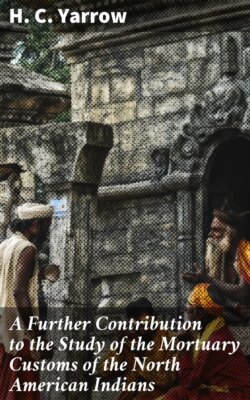A Further Contribution to the Study of the Mortuary Customs of the North American Indians

Реклама. ООО «ЛитРес», ИНН: 7719571260.
Оглавление
H. C. Yarrow. A Further Contribution to the Study of the Mortuary Customs of the North American Indians
A Further Contribution to the Study of the Mortuary Customs of the North American Indians
Table of Contents
LIST OF ILLUSTRATIONS
A FURTHER CONTRIBUTION. TO THE. STUDY OF THE MORTUARY CUSTOMS OF. THE NORTH AMERICAN INDIANS
INTRODUCTORY
CLASSIFICATION OF BURIAL
INHUMATION
PIT BURIAL
GRAVE BURIAL
WAH-PETON AND SISSETON SIOUX OF DAKOTA
BURIAL OF THE CHIEFTAIN
CANOE BURIAL IN GROUND
STONE GRAVES OR CISTS
BURIAL IN MOUNDS
BURIAL MOUNDS OF OHIO
EXCAVATION OF AN INDIAN MOUND
BURIAL BENEATH, OR IN CABINS, WIGWAMS, OR HOUSES
CAVE BURIAL
EMBALMMENT OR MUMMIFICATION
URN-BURIAL
SURFACE BURIAL
CAIRN-BURIAL
CREMATION
PARTIAL CREMATION
AERIAL SEPULTURE
LODGE-BURIAL
BOX-BURIAL
INNUIT OF UNALAKLIK
INNUIT OF YUKON
INGALIKS OF ULUKUK
TREE AND SCAFFOLD BURIAL
FUNERAL CEREMONIES AND MOURNING OBSERVANCES
“KEEPING THE GHOST.”
PARTIAL SCAFFOLD BURIAL AND OSSUARIES
SUPERTERRENE AND AERIAL BURIAL IN CANOES
FUNERAL CEREMONIES
MOURNING OBSERVANCES
AQUATIC BURIAL
LIVING SEPULCHERS
MOURNING, SACRIFICE, FEASTS, FOOD, DANCES, SONGS, GAMES, POSTS, FIRES, AND SUPERSTITIONS IN CONNECTION WITH BURIAL
MOURNING
SACRIFICE
FEASTS
SUPERSTITION REGARDING BURIAL FEASTS
FOOD
DANCES
SONGS
GAMES
POSTS
FIRES
SUPERSTITIONS
FOOTNOTES
INDEX
Note on Illustrations
Отрывок из книги
H. C. Yarrow
Published by Good Press, 2019
.....
When a Comanche is dying, while the death-rattle may yet be faintly heard in the throat, and the natural warmth has not departed from the body, the knees are strongly bent upon the chest, and the legs flexed upon the thighs. The arms are also flexed upon each side of the chest, and the head bent forward upon the knees. A lariat, or rope, is now used to firmly bind the limbs and body in this position. A blanket is then wrapped around the body, and this again tightly corded, so that the appearance when ready for burial is that of an almost round and compact body, very unlike the composed pall of his Wichita or Caddo brother. The body is then taken and placed in a saddle upon a pony, in a sitting posture; a squaw usually riding behind, though sometimes one on either side of the horse, holds the body in position until the place of burial is reached, when the corpse is literally tumbled into the excavation selected for the purpose. The deceased is only accompanied by two or three squaws, or enough to perform the little labor bestowed upon the burial. The body is taken due west of the lodge or village of the bereaved, and usually one of the deep washes or heads of cañons in which the Comanche country abounds is selected, and the body thrown in, without special reference to position. With this are deposited the bows and arrows; these, however, are first broken. The saddle is also placed in the grave, together with many of the personal valuables of the departed. The body is then covered over with sticks and earth, and sometimes stones are placed over the whole.
Funeral ceremonies.—the best pony owned by the deceased is brought to the grave and killed, that the departed may appear well mounted and caparisoned among his fellows in the other world. Formerly, if the deceased were a chief or man of consequence and had large herds of ponies, many were killed, sometimes amounting to 200 or 300 head in number.
.....